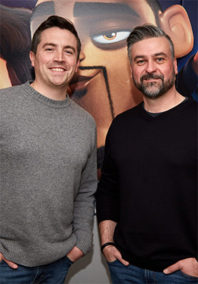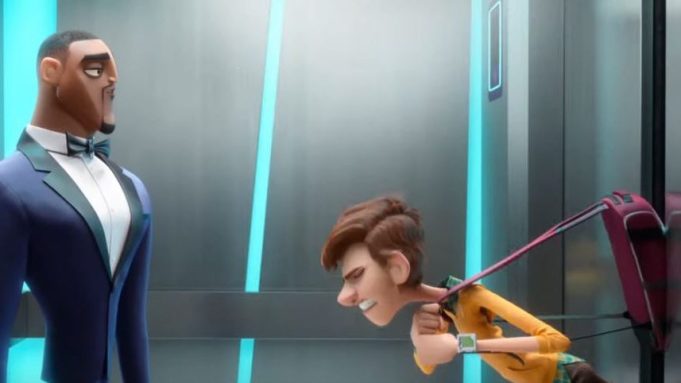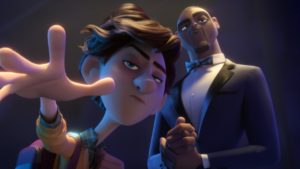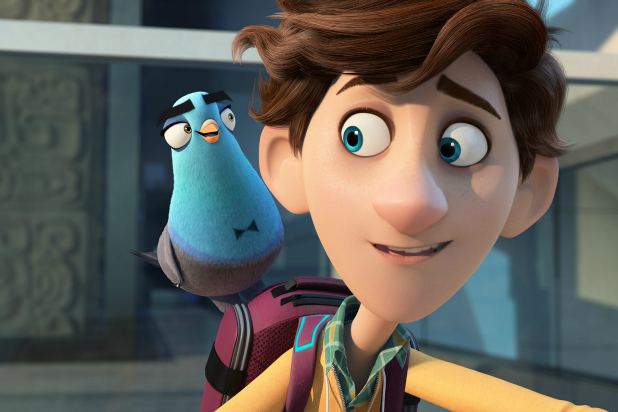
The magic of honest storytelling can far too easily get lost in the shuffle…
Super spy Lance Sterling (Will Smith) and scientist Walter Beckett (Tom Holland) are almost exact opposites. Lance is smooth, suave and debonair. Walter is … not. But when events take an unexpected turn, this unlikely duo are forced to team up for the ultimate mission that will require an almost impossible disguise – transforming Lance into the brave, fierce, majestic… pigeon. Walter and Lance suddenly have to work as a team, or the whole world is in peril.
Now in theatres everywhere; Spies in Disguise is the kind of movie that I had quite honestly forgotten could still get made. A fun piece of popcorn cinema for the entire family that has a positive message while not straying too far outside of its chosen genre, that’s what this movie is…and in spades.
In advance of its release I got the chance to sit down in a business hotel restaurant to talk with the directors behind the film Troy Quane and Nick Bruno and while we talked about a myriad of different things around the film I just couldn’t shake the honest feeling that I got from both men and the film itself. That this is always supposed to be a hell of a lot of fun and it’s nice to see it all translate on to the screen.

Dave Voigt: Obviously congratulations on the movie, it’s a lot of fun. I think the one thing that really stood out for me is that this film actually plays it pretty straight from a genre standpoint. I’m curious to know if that was the goal going into production on this or if it evolved over time, because correct me if I’m wrong but it was the short film Pigeon: Impossible that was the inspiration for all this?
Troy Quane: Yeah that short is really what got the ball rolling on all this and I’m really glad you said what you just did because from minute one in production was to make this full octane spy movie that just happened to be animated with this great buddy dynamic and all the comedy that comes with that and just leaning into the animation and gonzo idea of turning the world’s greatest spy into a pigeon!
Plus we wanted the comedy to be the contrast for the whole thing which is why we play all the spy stuff pretty straight down the line. We didn’t want Lance Sterling to be acting any different while he was a pigeon but we really wanted to mine the comedy that comes out of that contrast. That was something stylistically that I know we both really enjoy rather than throwing out one liners in every other line of dialogue so we can make it situational and feel genuine.
Nick Bruno: We used to tell the animators that before anything happens and we have images to look at we just want you to imagine that you’re watching Skyfall but we’ve replaced Daniel Craig with a pigeon! (Laughs) It’s all got to play the exact same way.
Now this might feel like a bit of a dumb question…
NB: We LOVE dumb questions…
TQ: We’ll try and give dumb answers (Laughs)
For people on the outside looking in when they see people directing a film for the first time in the live action world they think it’s a passion project or it’s something that they did independently which got picked up by a studio, etc etc etc. BUT when someone gets their first directing gig coming out of a huge animation house like Blue Sky, it feels very much like a situation where someone higher up is basically saying…”Ok, it’s your turn”. How does the call for you guys to tackle a project like this come about?
NB: You know that’s a really good question because in animation studio setting there will always be certain people who stand out as story tellers and they end up getting into the mix of it all pretty easily by looking at scripts and seeing ideas. On this film, the premise is an obviously silly one but what we really liked independently of each other because we didn’t know each other before we worked together on this project was the seeds of something really amazing. Not just a spy movie, which obviously is something that any of us would want to make but there’s such a great message in the film about how teamwork can be something that can actually save the world. The world of espionage is basically built on a foundation of mistrust and not working well with others but here we get to play with that because this guy who has always flown solo is not turned into this flock animal that has to work together with others in order to get the job done. It’s great thematic and great fun, plus knowing that this might be some kids very first spy movie is something that we feel very responsible about and this just such a great story to tell.
TQ: Plus this is something that for us we have to commit to for over four years, with something like that you have to bring some genuine passion to it all and I really think that it plays out incredibly well on the screen.
These films are just too much work and are too expensive to make and really no matter the scale that you’re working on, the passion is always there and really that’s what keeps everyone going.
You’re right; these things are such a long process. When did you ultimately come down to the pairing of Will (Smith) and Tom (Holland)?
TQ: It really started when the characters were created and presented to us. We very clearly wanted Lance Sterling to be the world’s greatest spy bar none. He needed to stand shoulder to shoulder with Bond, Bourne & Ethan Hunt and be one of those guys in the exact same sentence and we start to think, who could pull off all the qualities we want of bold, brave, charismatic, suave, a little arrogant and still very funny, Will Smith just kept coming up for us. So of course we put it to the studio in the back of our minds think that this guy is one of the biggest movie stars in the world, he’ll never say yes to us. But then of course we find out we got a meeting, which of course caused us both to pass out (Laughs) but after we pull ourselves off the floor we got to work. We gave him our pitch and he loved the comedy, he loved the action but we really got him was the underlying story that Nick was talking about before. Will really is this brilliant actor, but he’s just as brilliant of a storyteller and that’s the thing that he really looks for when deciding on projects, and we delivered on that.

The same thing really goes for Tom. We needed this foil for Lance this dorky and loveably awkward kid who has barely been outside his cubical much less his hometown who is this bonfide genius at the same time who has real courage of conviction. This guy is a really complex character and as soon as we heard Tom’s voice we just knew that was the guy. We met with him and pitched him and after a few meetings we just knew that with the earnestness and sincerity that he brought to the table that he would just be a perfect match.
And getting two guys with those right qualities was just so important because they never actually met until we had the premiere for the film.
I’ve got to imagine that’s just such a huge part of the process because like you say, you’re spending four years on something like this and it’s a buddy comedy where essentially the leads are never in the same room together at the same time. I’ve got to imagine that it takes a huge amount of confidence and faith in the process on your part to know that it’s going to work once it’s all put together.
NB: Oh it’s huge, it’s everything. The entire casting process is really about looking to people who we think will work the way that we work because we’re both incredibly collaborative people. We don’t want to just give instruction, but rather to have people that we are sure are really seeing our collective vision and in tune with the material and aren’t afraid to add to it if needed. So many of the people we had on this were not only these great actors, but really these great comedians as well. For a buddy comedy to feel right, it’s important have that “banter” a lot of which can come from improve and those moments where people are maybe stammering a little. You’ve got to have the script, but you’ve also got to have people with the confidence to play around in the material in the moment as needed. We so fortunate to get extra time with both Will & Tom to go back and forth to constantly be tweaking the material to get it right where we needed to be, you really feel the chemistry between those guys on the screen because they truly believed in the material and wanted it to succeed.
It always fascinates me on films likes this because while you’re both obviously storytellers and work well on that front, in animated features there’s always this looming technical minutia behind it all as well that you have to pay reverence to. How do you ultimately strike a balance between it all and create those moments that you want to make for these films versus the technical issues that can come up where you may have to invent a whole new way to get a visual sequence that you want for the film?
TQ: That really and truly is the job of directing, sitting in that chair and deciding on what is right for the story, for the entertainment value and for the audience to take in to advance the story.
And plus in films of this nature there’s always some shots that in real life you could never actually SHOOT either?
TQ: (Laughs) Yeah no doubt, we always try and keep it all as grounded as possible and have shots that we at least FELT like we could. We were very conscience of the physics of the camera movement so that we never left the world that we had created and ironically enough the tools these days in animation are so good that it’s hard to trick them. We work with over 550 of the smartest people over at Blue Sky and we will constantly be throwing them challenges and they would always be finding solutions for us, and solutions that worked with the story that we were trying to tell as well.
Honestly it’s usually the shots that you wouldn’t expect that cause the biggest problems. There’s the big scene in the film with the bad guy Kimura and we do something pretty crazy to him and that was an incredibly hard sequence. It involved getting three different departments who usually follow one another in the labor process to get together and make it all talk to one another to create a sequence that audiences had really never seen before. We throw down the gauntlet and they pick up every time we love ‘em.
Has there been an ‘exhale’ moment for you guys yet? Like you said this has really been 4 some years of your lives, it’s being seen by audiences, it’s out there. Have you had that moment yet?
NB: You know I’d honestly say that it’s come in lots of little ‘exhale’ type moments for us for a variety of different reasons. However I’d say that when I got to watch this movie with kids, obviously it works well for all audiences but when I got to experience it in a room full of kids, the level of engagement with it all was so great. No just them laughing at the jokes, but yelling at the screen and reacting to it all was amazing because really none of what they just saw was real, but they believed every single minute of it.
That’s the magic of it all right?
TQ: We always say that it’s really the greatest magic trick in the world, every day when we’d go into the office we’d try to make each other laugh or cry and that’s all you can really trust in and hope that other people feel the exact same way that you do. There’s nothing in this world that feels better than that.
Spies In Disguise is in theatres everywhere now.

